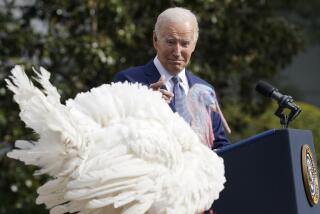Woman Gives Birth at 63: Ethical Questions Raised
- Share via
A 63-year-old Southern California woman has become what is thought to be the oldest woman in the world to give birth to a healthy infant. But she only accomplished the feat through the use of eggs donated by another woman and by lying about her age, according to USC doctors.
The case of the woman, whose identity has not been revealed, is reported today in the journal Fertility and Sterility by Dr. Richard J. Paulson, an infertility specialist at USC.
The woman, who is married and had been childless, began infertility treatment at the clinic three years ago. She gave birth to a 6-pound, 2-ounce girl at Loma Linda University Medical Center on Nov. 7, 1996. The father is 60.
The woman is the oldest on record ever to give birth. In 1994, a 62-year-old Italian woman gave birth to a healthy infant. The USC patient, however, was 15 months older than the Italian woman.
While infertility doctors have clearly established that a post-menopausal woman is capable of giving birth with donor eggs, the case is reason to again ponder the unknown biological limits of pregnancy and the ethical question of whether there should be an age cap on becoming a parent.
“This is not a huge scientific leap. It’s an incremental step to say, ‘Here is someone a year older than the previous oldest,’ ” Paulson said. “Still, we were in unknown territory.”
The case began three years ago when the woman arrived in Paulson’s clinic, stating that she was 50 and bearing medical records attesting to that age. As pioneers in the use of donor eggs for post-menopausal women, USC has an age limit of 55 on accepting patients--one of the most liberal among U.S. infertility centers.
“All of her medical records supported that she was 50,” Paulson said. No additional identification was sought from the woman. From her appearance, he said, “we didn’t have reason to suspect anything different.”
After an extensive medical work-up required of all older women seeking to become pregnant, the woman underwent two cycles of in vitro fertilization, using her husband’s sperm and eggs from an anonymous donor. She became pregnant on the fourth in vitro fertilization attempt, and finally--when she was 13 weeks pregnant--confessed her actual age.
“I did not believe it when my front-desk employee told me I was seeing a 63-year-old,” said Dr. Herminia S. Salvador, an obstetrician at Loma Linda University, who took over her case at 15 weeks gestation. “I had seen her in the waiting room and I thought she must be a gynecology [rather than obstetrics] patient. She looked 63 to me.”
The patient experienced minor complications during the pregnancy, including elevated blood pressure and gestational diabetes that were controlled by bed rest and diet, respectively. The healthy girl was born by Caesarean section at 38 weeks gestation and was breast-fed by the mother.
The patient’s 86-year-old mother, who lives with her, did not know about the pregnancy until the day the patient delivered.
“But the grandmother was delighted,” Salvador said. “The family is doing very well. The grandmother is helping a lot. And the husband adores the baby.”
The outcome was better than what he feared, Paulson said.
“I was quite nervous . . . we have no experience beyond the early 50s. I was worried about her more than the baby. The baby usually gets what it needs.”
Medical literature attests to fewer than 100 births to women over 50 worldwide. The average age of women using egg donation at the USC clinic is 43.
Nevertheless, it is becoming increasingly common for older women seeking egg donation to lie about their age, said Dr. Mark Sauer, an infertility specialist at Columbia University Medical School in New York, who pioneered the use of donor eggs in older women while at USC in the late 1980s.
“There is no question in my mind that many of my patients in the oldest age ranges are not honest about their age,” Sauer said. “Whenever you place an age limit, you have people who break the rule.”
Infertility clinics, Paulson and others noted, may have to reconsider their age limit policies or request that patients document their ages.
Although many clinics have raised their age limits for egg donation over the past several years, Sauer argues that 55 should remain the limit.
“The danger in treating 60-year-olds is that it’s unknown territory,” said Sauer, who asks to see a driver’s license and passport from older candidates. “There is no data, except for anecdotal material.”
The other issue is an ethical one, he said.
“I lose my comfort level after 55 because I have to believe that there are quality-of-life issues involved in raising a child at [the parent’s] age. When [the baby born in November] is 5, her mother will be 68. And I have to believe that a 78-year-old dealing with a teenager may have some problems.”
Paulson said: “Our age limit is a guideline. We look very carefully to make sure these women are healthy, and we make sure this is really what they want. But people . . . age differently. And as baby boomers age, what we consider to be very old is very different,” he said.
Life expectancy for women has increased dramatically too. A 50-year-old woman today can be expected to live 28 more years, he said.
Even his 63-year-old patient had understandable reasons to seek motherhood, Paulson said.
“She had been married 13 years. It was the first marriage for both she and her husband. They are of a belief that a family is very important. I presume that she had been trying [to get pregnant] the whole time they were married, but perhaps she went through menopause and then sought treatment,” Paulson said.
The patient, a Filipina, has a supportive extended family that could help in raising the child if necessary, Salvador said.
Dr. Jane L. Rosenthal, a Columbia psychiatrist, is following a group of women who were age 47 or older when they became pregnant. “There is something about why they want this that is very compelling and very poignant,” she said. “There are very few times when I find myself saying, ‘This isn’t right.’ ”
Paulson said he isn’t angry at the patient who told him such a whopping fib.
“I was happy for her, in a way,” he said. “Let’s say I was a guide taking people to Mt. Everest, and I had an age limit of 55. Then I found out that I’d taken someone to Everest and back and they were 63. I’d say, ‘Good for them.’ I feel silly I was fooled, but still, good for them.”
More to Read
Sign up for Essential California
The most important California stories and recommendations in your inbox every morning.
You may occasionally receive promotional content from the Los Angeles Times.













